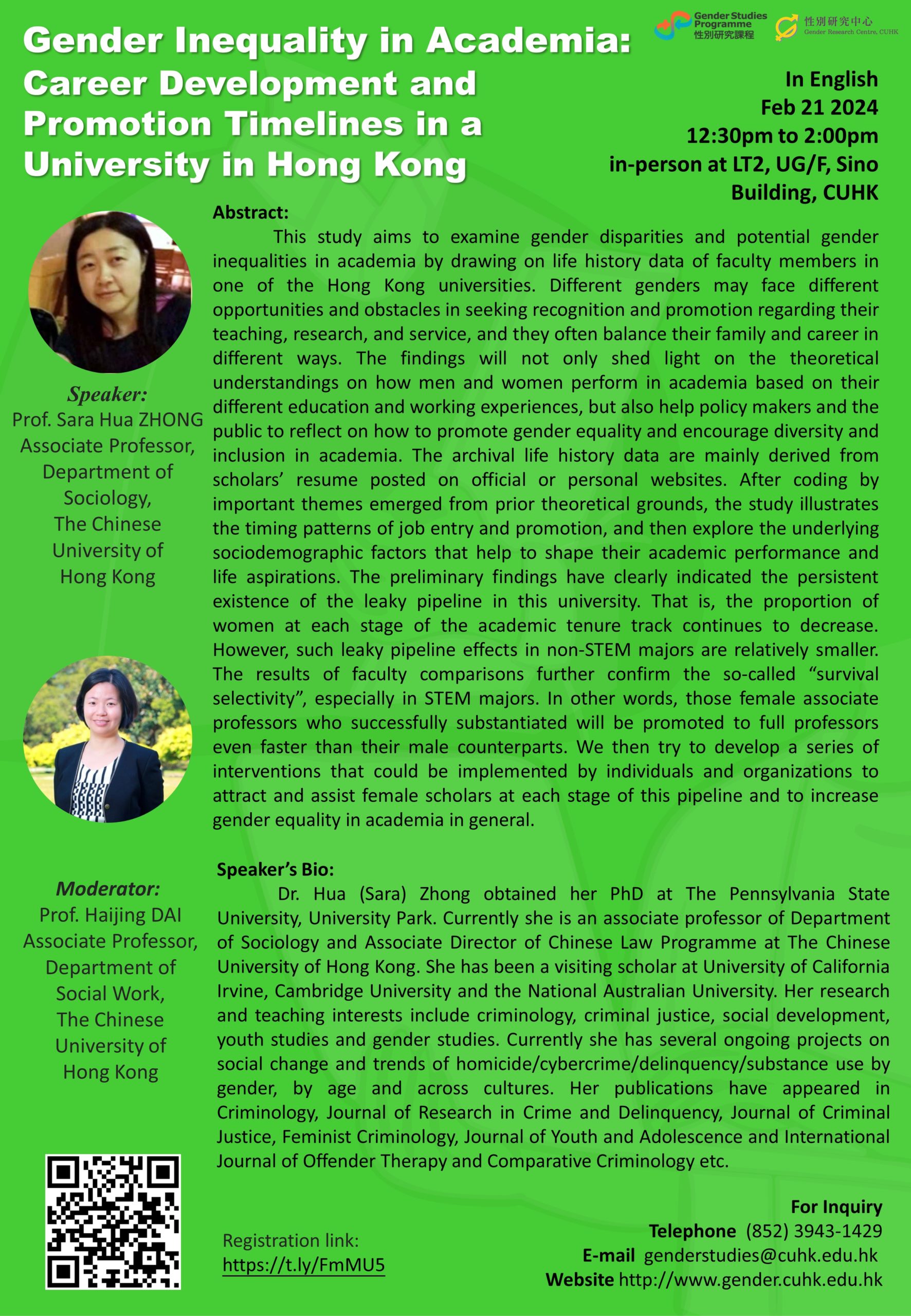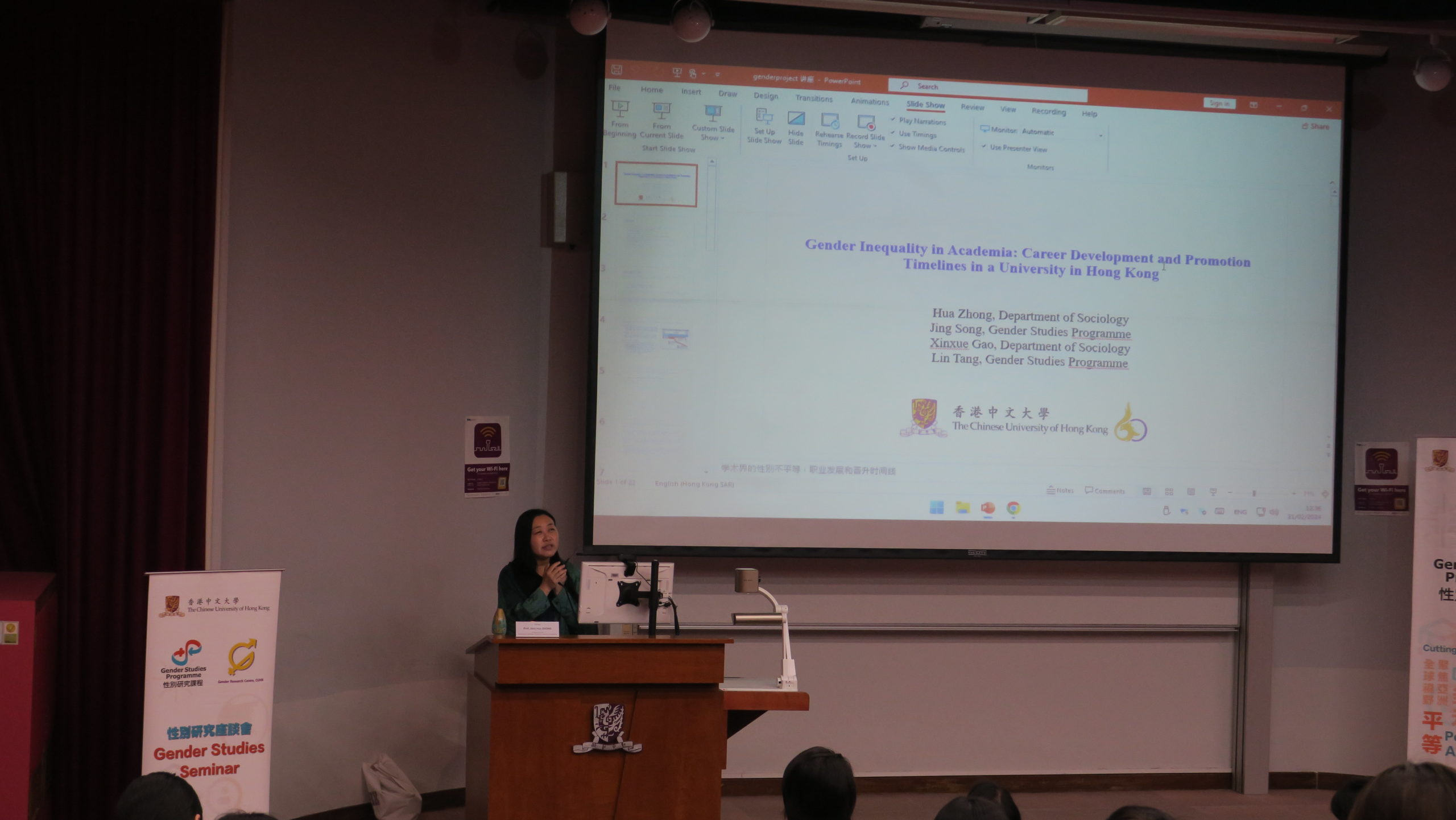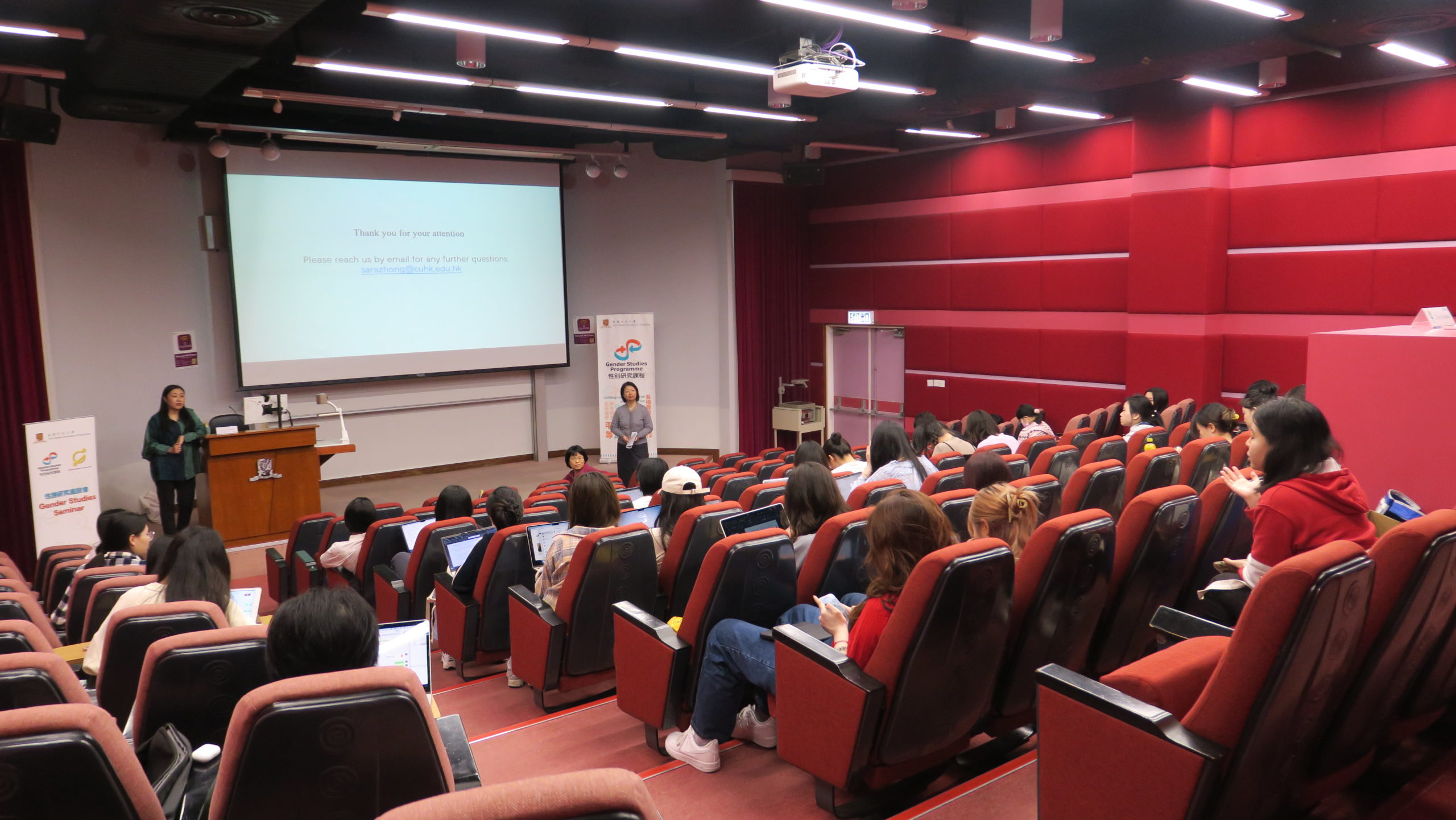该讲座介绍了在香港的一所大学进行的关于学术职业发展和晋升周期的研究,旨在揭示学术界性别不平等的现状及影响,并探索其背后的社会机制。这篇总结将探讨性别不平等在学术界中的理论视角、持续存在的因素以及未来方向。
首先,讲座介绍了性别不平等在学术界中的两大理论视角:新自由主义思想和男性中心主义传统。新自由主义思想强调市场竞争、导致了系统化的精英主义,在现有男性主导的评价体系上可能加剧了学术界的性别不平等现象。男性中心传统则解释了女性学者在学术生涯中面临的挑战,如女教师数量增长速度落后于女学生增加速度的”管道泄漏(Leaky Pipeline)”现象,以及”生存选择性(Survival Selectivity)”:女性学术工作者极其努力,从而才能在不平等的传统和男性中心主义的标准之下取得成功。
其次,讲座探讨了导致这种不平等持续存在的原因。研究发现,COVID-19大流行对女性研究者的生产力造成了不同程度的影响。她们在疫情期间的论文投稿量明显减少,而男性研究者的投稿量没有明显下降。此外,女性教师通常承担更多的教学工作、行政服务和情绪劳动,但这些工作往往得不到足够的认可。家庭劳动分工也是一个重要因素,从事学术行业的母亲在学校和托儿所关闭的情况下需要承担更多家庭责任,“母职惩罚(Motherhood Penalty)”对她们的工作产生了负面影响。单身的女性学者则在学术生产力方面表现出了一些积极的变化。上述结果佐证了男性中心主义传统的影响。
该研究还采集了香港一所大学教职成员的生活历程数据,并从领导力、晋升速度等维度对先前理论中的主要因素进行编码。研究结果显示,该大学中“管道泄漏”现象持续存在,即学术生涯轨迹的更高阶段的女性比例继续下降;非STEM专业中的渗漏现象相对较小,非STEM专业内部也存在一定差异。教职晋升速度对比的结果进一步证实了所谓的”生存选择性”,尤其是在STEM专业中:一些STEM专业中,女性教授晋升到更高级别的速度有时甚至比男性同行更快。该研究提出,我们需要制定一系列干预措施,以吸引和帮助每个职业阶段的女性学者,促进学界的性别平等。
未来,该研究将采集更多缺失的简历数据,进行统计分析以验证相应的理论;使用邮件调查和深入访谈来研究影响学术界性别不平等的因素;扩大职业发展研究的范围,涵盖博士后和讲师;此外还将加入更多的跨文化和趋势研究。通过共同努力,我们相信可以创造一个更加公平和包容的学术环境。
Written by: 姜语菲
This week’s seminar focuses on gender inequality in academia. Using the timeline of career development and promotion of female researchers at one University of Hong Kong as an argument, the speaker reveals how women’s advancement in academia has been hindered in recent years.
First, the author presented the theoretical background of this research. Under the neoliberal ideology, the general social environment encourages competition among individuals in a free market with minimal state intervention. This phenomenon is reflected in academia. In addition, there is currently a leaky pipeline and survival selectivity in academia under the traditional male-centered ideology, which means that women can only be promoted in academia if they perform extremely well, and the higher the position, the lower the percentage of women.
The time of this research focused on the period of the Pandemic. The authors note that the number of academic papers submitted by female researchers has declined dramatically with the outbreak of the Pandemic. The author presume that this phenomenon is related to the drastic increase in teaching workload, administrative services, and caring work of female researchers during the epidemic. It has been found that female researchers take on more teaching-intensive lower-level positions as well as administrative tasks so that the remote online office of Pandemic has created new challenges for them. At the same time, Pandemic has led to the closure of institutions such as schools and day-care centers, which in turn has made it necessary for them to take on more domestic work.
In this context, the author corroborates her conjecture by collecting and coding data about the official CVs of female staffs at a university in Hong Kong. First, the authors found that the leaky pipeline persists at this university, meaning that the percentage of women continues to decline as they advance through the academic tenure track stages. At the same time, this situation is exacerbated in STEM majors. However, due to survival selectivity, women are instead promoted faster than male professors in some STEM majors. This research suggests that society should develop certain interventions to help women academics better participate in every stage of academic promotion.
Indeed, this phenomenon also reflects the current gender segregation in the workplace.Specifically, horizontally, women only have access to so-called lower-level, lower-paying jobs, and vertically, women are slower to advance and achieve in the same job, with the tacit assumption that men are more talented (England, 1993). In addition, the impact of the glass ceiling effect is also worth noting. Men are more likely to achieve leadership positions than women, while women, if they do achieve leadership positions, are stereotyped as inherently less capable (Davidson et al., 1992).
In essence, this is the gender discrimination brought about by patriarchal traditions, which impede women’s professional development and place additional social pressures on men, which is to say that it is not beneficial to either sex. Therefore, society should pay attention to this phenomenon.
Written by: GUO, Yijia
The theme of the seminar is Gender Inequality in Academia: Career Development and Promotion Timelines in a University in Hong Kong, which was shared by Prof. Sara Hua ZHONG. This study aims to explore gender differences and potential gender inequality in academia in Hong Kong.
In recent years, gender inequality in academia has received attention, particularly during the pandemic. Studies have shown that female researchers experienced a significant decline in research productivity compared to their male counterparts. One explanation for the exacerbated gap between male and female faculties is the unequal share of teaching workload, administrative service, and care labor in virtual settings. Another explanation is the gender division of housework in the private sphere, with academic mothers taking on more of the burden of care and home education. Notably, single and childless female researchers showed a slight increase in academic productivity. However, different genders may face varying opportunities and obstacles when pursuing teaching, research, and service.
In terms of research methods, life history data of faculty members from one of the universities in Hong Kong was collected. The archival life history data is mainly derived from scholars’ CVs published on official or personal websites. After sociological coding, the time pattern of job entry and promotion is clarified.
The findings demonstrate the persistent existence of the leaky pipeline in this university, as evidenced by the continuous decline in women’s representation at each stage of the academic tenure track. However, such leaky pipeline effects are relatively smaller in non-STEM majors. The results of faculty comparisons further confirm the concept of “survival selectivity,” particularly in STEM majors. There is a need to develop interventions that individuals and organizations can utilize to support women’s academics and promote gender equality in academia.
The future research directions will involve increasing the sample size and obtaining a more diverse and cross-cultural pool of research subjects. Additionally, methodologies such as conducting in-depth interviews will be integrated to acquire a profound understanding of potential factors that affect gender inequality in academia.
Written by: HU, Bei
求得一席終身教職是多數教員在學術界的最高理想。近年來,這條通往專業人士的道路受到了重視多元共融、防治性騷擾等香港性別友好機構的更多保護,然而這種積極的努力是否真的改變了學術界的性別不平等?在週三性別研討會中,社會學系鍾華教授基於對一香港高校的學者簡歷的生活史研究,揭示了學者入職和晉升的時間模式,並探討了學術界性別不平等的社會機制。
來自香港的數據展現了學術界的管漏現象(leaky Pipeline):女性比例在每個關鍵陞遷中持續下降。其中,STEM學科的管漏現象更為嚴重,身為已婚母親的教職員處境最為艱難。新自由主義打著任人唯賢的幌子讓大學變成市場,但成為具有市場價值的賢才的過程是高度性別化的。研究已顯示,男女研究生產力加劇的差異在疫情中凸顯,女性學者承擔了更多家務、學術屆的教學和行政工作,以及情感勞動。她們被視為處理孩子的哭鬧、擔任本科生主管、給予學生情緒幫助的專家。我們在學術屆中遺憾地發現,女性學者往往成為「我從未準備好升遷」的邊緣者,或是集「美好男性氣質」於一身的終身教職倖存者。
值得一提的是,官方網頁的簡歷始終是勝者的高歌,退出學界的「失敗者」(在自成一體的學屆價值判斷中)是隱形的:他們不存在於可被搜尋的教職員網站,也缺乏可及的公共郵箱以取得聯繫。根據管漏現象的數據,成為「前學者」才是學術界的主流。他們是誰,又為何、如何離開?鍾老師的研究也呼籲日後研究可更多地關注離開學術界的人們,他們的主體經驗不應該被忘卻在終身教授的代表之中。
Written by: HUANG, Jiying





A
A
A
Contact Us